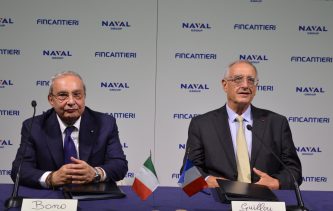By Pierre Tran
Paris – Fincantieri and Naval Group (NG) signed June 14 an agreement setting out cooperation on their Poseidon project, a joint venture aimed at boosting Italian and French collaboration in building and selling warships for navies at home and abroad.
“Following the announcement made on 23 October 2018, today Fincantieri and Naval Group signed in Rome the Alliance Cooperation Agreement, which sets out the operational terms for the incorporation of a 50/50 owned joint venture,” NG said in June 14 statement.
“There was good support from the ministers,” NG chief executive Guillou said.
“Perhaps there will be a share capital deal later,” he added.
The creation of a jointly owned subsidiary is a cooperative step but real consolidation in European defense industry requires change of ownership in the parent companies.
Previously, there had been a plan for a cross-shareholding of five to 10 percent between Fincantieri and NG, but the French authorities dropped that as concern rose over the anti-European sentiment of the Italian government, a fragile coalition between the far-right League and anti-establishment Five Star Movement.
The alliance agreement aims to share best practices between the partner companies, work on selected research and development (R&D), trim procurement costs, and make joint offers for French and Italian programs and export deals.
Submarines are excluded from the deal, which covers surface warships.
The joint venture is expected over the next 10 years to win orders worth up to €5 billion ($ billion), build 10-15 warships and achieve synergies of 10-15 percent, Reuters reported.
Thales, which builds naval combat systems, holds a 35 percent stake in NG, with the French state owning most of the share capital.
There is need for “critical mass,” to be competitive, Guillou said June 14 at Paris Air Forum, a business conference organized by financial website La Tribune.
The French Navy depends on exports to generate a “supplementary” €400 million a year, he added.
“Without exports, the military budget law is beyond execution,” he said.
There is “complementarity” between Fincantieri and Naval Group in the world market, as the former is present in 15 countries, while the latter is in 10, with no overlap, he said.
That bilateral cooperation is essential in view of severe competition from China and Russia, and shipbuilders in Korea, Ukraine and India.
A European cooperative link is needed due to a greater burden of research and technology, and R&D, he said.
Twenty years ago a warship would sail with two generations of technology, but the French intermediate frigate being built is expected to support six generations in its operational life. That required sharing the cost of R&T and R&D.
There will be six executives on the board of the joint venture, with three from each partner company. Fincantieri will name the chairman and chief operational officer for the first three-year term, with NG appointing CEO and chief financial officer.
Bono will be board chairman, and Guillou will also sit on the board.
The joint venture company will be legally set up by the end of the year, following authorization from the authorities, with headquarters in Genoa, northern Italy, and a subsidiary at Ollioules, just outside the Toulon naval base, southern France, the French shipbuilder said.
“The alliance represents a great opportunity for both groups and their ecosystems to enhance their ability to better serve the French and Italian navies, to capture new export contracts, to develop new technologies and, ultimately, to improve the competitiveness of the naval sectors of both countries,” NG said.
France and Italy “support the key initiatives set by Fincantieri and Naval Group which intend to swiftly put in place, notably setting up in 2019, a joint venture of equal parts, for which the aim is to reach commercial and industrial synergies,” the two governments said in an Oct. 23 statement.
The European Union’s antitrust arm is examining Fincantieri’s acquisition of 50 percent of Chantiers de l’Atlantique, a French shipbuilder. That company is a civil shipbuilder with the sole yard in France big enough to build a future aircraft carrier, so deemed to be of strategic importance.
Giuseppe Bono, chief executive of Fincantieri, and Guillou signed the alliance agreement on the Federico Martinengo, an Italian Fremm multimission frigate at La Spezia naval base.
The Fremm frigate was developed and built in a Franco-Italian program, with a lower level of joint procurement compared to the Horizon air defense frigate, also a project between the two countries.


